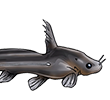Al-Hassan, J.M., Renno, W.M., Oommen, S., Nair, D., Paul, B.M., Mathew, B., Kumar, J., Ummerkutty, A. & C. Pace-Asciak. 2025. Regeneration of Insulin-Producing β Cells, Reduction in Inflammation and Oxidation Stress, and Improvement in Lipid Profile in a Type 1 Diabetes Rat Model by Intraperitoneal Injection of the Growth Factors-Rich Catfish Skin-Derived Fraction-B: An Introductory Report. Biomolecules, 15(7), 929-965.
https://doi.org/10.3390/biom15070929
https://www.mdpi.com/2218-273X/15/7/929
Keywords: diabetes; catfish; Fraction-B; β-cells; stem cells; lipids; proteins; growth factors; regenerationAbstract
Type 1 diabetes (T1D) results from the autoimmune destruction of insulin-producing β-cells. The regeneration of durable insulin-producing β-cells remains a critical challenge. This study investigated the regenerative potential of Fraction-B (FB), a catfish skin-derived preparation rich in growth factors, in a T1D rat model to regenerate active β-cells. Sprague Dawley rats with T1D caused by streptozotocin injection received daily intraperitoneal injections of FB for 8 weeks. FB treatment significantly reduced blood glucose to a level close to that of normal control animals, increased serum insulin and C-peptide, and restored pancreatic insulin content. Histopathological and immunohistochemical analyses confirmed the regeneration of insulin-producing β-cells in pancreatic islets. FB treatment also improved diabetes-related health issues through a reduction in inflammation and oxidative stress, and an improvement in lipid profiles without toxicity or side effects. The regenerated β-cells remained functional for 48 weeks without the use of immunosuppressants, until the animals were sacrificed. These findings suggest FB treatment to be a promising procedure for translational research into T1D treatment.






